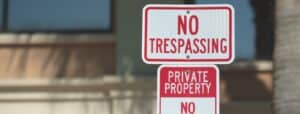
Investigative Article
The Elements of Criminal Trespassing in Arizona: An Investigative Report
In Arizona, trespassing is taken very seriously. Defined as knowingly entering or remaining unlawfully on any property after being explicitly told by the property owner or occupant, through signage or personal communication, that entry is prohibited, trespassing can lead to severe consequences, including fines and even imprisonment. The legal definition of trespassing is not straightforward, and there are different degrees of trespassing, each with specific criteria. In this investigative report, we delve into the elements of criminal trespassing in Arizona, analyzing the statutes and exploring the practical implications of the law.
Understanding the Law: Elements and Degrees of Trespassing
Arizona's statutes outline three degrees of criminal trespassing, each with specific criteria. First-degree criminal trespassing occurs when a person enters or remains unlawfully on a residential structure or fenced commercial yard. Second-degree criminal trespassing occurs when a person enters or remains unlawfully on non-residential property or on a fenced residential yard. Finally, third-degree criminal trespassing occurs when a person enters or remains unlawfully on any property.
Specific criteria differentiate the three degrees of trespassing. For example, to commit first-degree criminal trespassing, the trespasser must knowingly enter or remain unlawfully on a residential structure or fenced commercial property. In contrast, third-degree criminal trespassing occurs when a person enters or remains unlawfully on any property, regardless of whether it is fenced or commercial. This distinction is crucial, as the degree of trespassing determines the severity of the charges and the potential penalties.
Aggravating Factors: When Trespassing Becomes an Aggravated Offense
While the three degrees of criminal trespassing cover most scenarios, aggravating factors can elevate the offense to a more severe crime. Aggravating factors are specific circumstances that make the offense more serious, such as the presence of a weapon or causing damage to the property.
Aggravated criminal trespassing is a Class 6 felony in Arizona and carries substantial penalties, including prison time, fines, and probation. For example, if someone enters a residential property unlawfully and is in possession of a weapon, the offense is considered an aggravated criminal trespass. Since the circumstances of each case are unique, aggravating factors require a careful assessment of the evidence.
The Role of Signage: How Can Property Owners Protect Themselves from Trespassers?
Arizona law recognizes various forms of communication as valid warning signs for trespassers, including verbal communication, fencing, and posted signs. Property owners can use signs to advertise that entry is prohibited and that trespassers will be prosecuted. However, property owners must make sure that their signage meets the legal requirements and that the wording is precise and unambiguous.
There are specific requirements for posting signs on commercial properties, such as the size and placement of the signs. In residential properties, the required wording may differ depending on whether the owner is trying to deter possible trespassers or if they are revoking permission to someone who already has access to the property.
Practical Implications of the Law: How Criminal Trespassing Affects Real-Life Situations
While criminal trespassing statutes may seem technical, they have real-life implications for property owners and trespassers alike. Property owners must be cautious when allowing access to their property, as even a momentary lapse in communication could lead to a trespassing charge. For example, if a homeowner forgets to revoke someone's permission to enter their property, that person could be charged with third-degree criminal trespassing if they enter the property without permission in the future.
On the other hand, trespassers must be aware that entering a property without permission is a violation of the law, regardless of their intentions. Even if someone enters a property to retrieve an item they believe belongs to them, if the property owner has explicitly revoked permission, the person could be charged with criminal trespassing. Moreover, since there are different degrees of trespassing, the charges and penalties will depend on the specific circumstances of the case.
The Importance of Legal Representation: Why Should You Seek Legal Counsel in a Trespassing Case?
If you are facing a criminal trespassing charge, seeking legal representation is crucial. Criminal trespassing charges can have life-altering consequences, including fines, community service, and even imprisonment. Moreover, since the circumstances of each case are unique, having an experienced criminal defense attorney by your side can be the difference between a favorable outcome and a conviction.
If you or someone you know is facing a criminal trespassing charge in Arizona, contact our experienced criminal defense attorneys at Cates, Hanson, Sargeant & Schoenau in Phoenix. Our attorneys have decades of experience handling criminal defense cases and can provide the legal counsel you need to build a strong defense.
For more information on criminal trespassing in Arizona and how we can help, visit our website at www.chmlaw.com.


Social Plugin